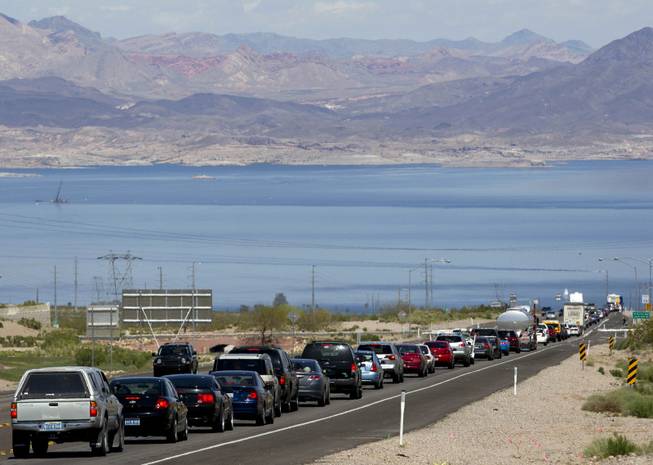
Julie Jacobson / AP
In this April 10, 2011, photo, traffic backs up heading southbound toward Lake Mead on U.S. Highway 93 in Boulder City. Hoover Dam, one of the world’s great engineering feats, is marred by roads with traffic so jammed along the Nevada-Arizona border that it tells a different story about the political will to maintain 21st century infrastructure.
Sunday, Feb. 22, 2015 | 2 a.m.
Related stories
Per-capita federal highway funding going to Nevada, which had been climbing, fell 6 percent from 2008 to 2013 and faces an uncertain future even as the state's population grows and infrastructure ages.
Gridlock in Congress over a highway bill that would keep the money flowing has made it difficult for transportation officials to plan for the long term, and they're increasingly relying on action closer to home to get things done.
"More and more, states are not counting on the federal allocation and are taking matters into our own hands," said Tony Illia, spokesman for the Nevada Department of Transportation. "We're charting our own destiny."
Figures compiled by The Associated Press show the total amount of money available to states from the Federal Highway Trust Fund has declined 3.5 percent during the five-year period ending in 2013, the latest year for which numbers were available. During that span, the amount of inflation-adjusted federal highway money dropped in all states except Alaska and New York.
In Nevada, the 6 percent drop from 2008 to 2013 comes in spite of a 41 percent increase from 2003 to 2013.
At the same time, needs in Nevada are mounting. Current funding levels only provide 60 to 70 percent of what's needed to maintain state highways, according to a recent report card from the American Society of Civil Engineers.
States around the country have tried to devise ways to fill the gaps. Governors and lawmakers in several states are proposing new taxes, tolls and fees to repair a road system whose historical reliance on fuel taxes no longer is providing enough money to cover its costs.
Nevada's Clark and Washoe counties have indexed their fuel tax — tying it to the price of gas rather than using a flat number that yields less money as cars become more fuel-efficient. A ballot measure slated for the 2016 election would allow indexing on the state's portion of the fuel tax, which has remained flat at 18.4 cents since 1995.
Clark County has indexed its fuel tax for a three-year trial period, and the move is projected to raise $700 million. That's expected to help the county complete nearly 200 road projects.
Other measures up in the Nevada Legislature include a move to send more of the Government Services Tax, which is levied on vehicle registrations, into the highway fund. A bill before lawmakers — SB149 — would send some of the money that's now going to the state general fund to the state highway fund.
That could bring an estimated $31 million more each year to the highway fund, according to transportation department spokesman Sean Sever.
Another idea tossed around in the Legislature is high occupancy transit lanes — better known as toll roads. The fast lanes, aimed at reducing congestion, could be financed by a private company, which would own the lane and keep the toll revenue for a set period of time.
"We're going to look to private industry to help us with some of our issues," said Republican Assemblyman Jim Wheeler, who chairs the Assembly Transportation Committee.
Despite the actions, state transportation officials say they don't want to do it on their own and would rather have consistent help from the federal government, which provides about a third of the $1 billion annual revenue in the state highway fund.
A temporary funding patch on highway funding is scheduled to expire in May and lawmakers in Congress have been at odds over a long-term plan. A federal fuel tax increase appears unlikely.
"We'd love to see any bill go through," Illia said. "We're not sure if the political will is there."

Join the Discussion:
Check this out for a full explanation of our conversion to the LiveFyre commenting system and instructions on how to sign up for an account.
Full comments policy